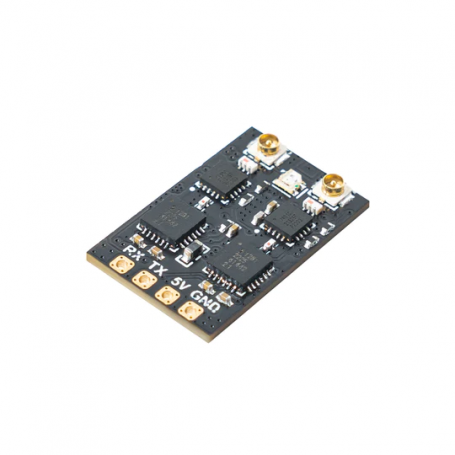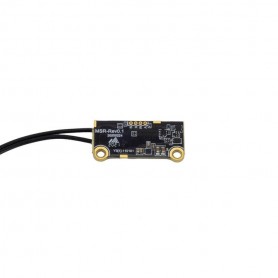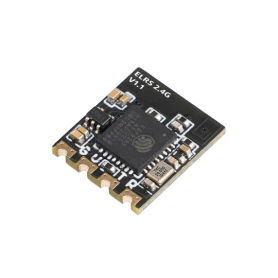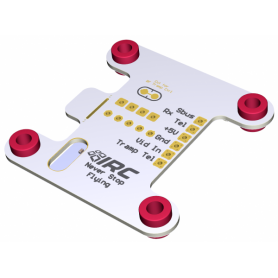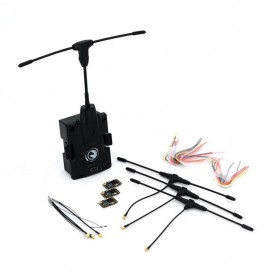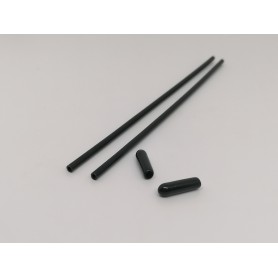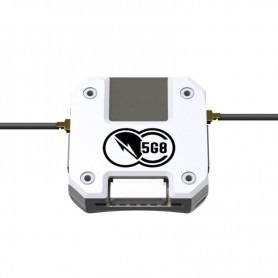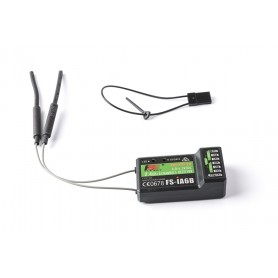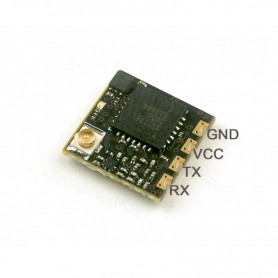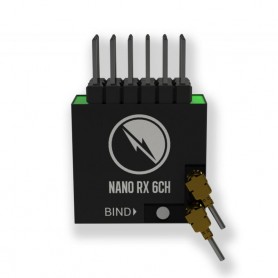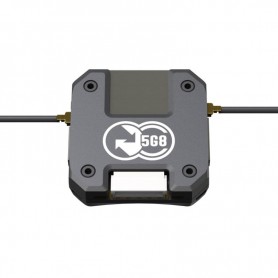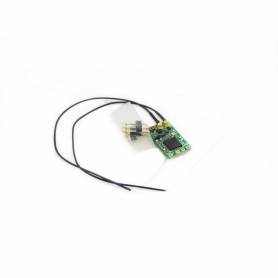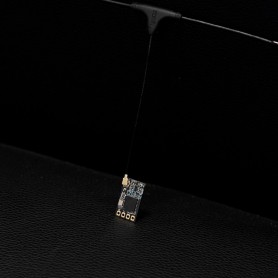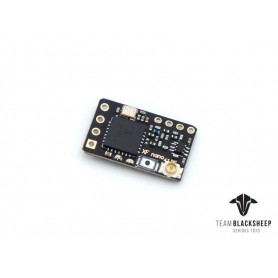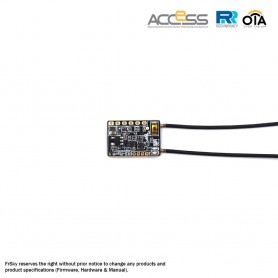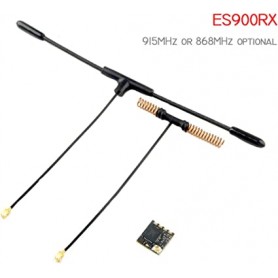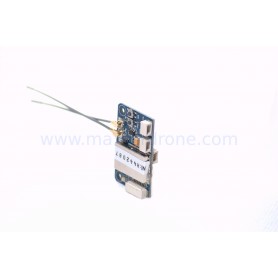BETAFPV SuperD ELRS 2.4G Diversity Receiver
BETAFPV SuperD ELRS 2.4G is the world's first True Diversity Receiver that applies two antennas, dual receiver chains, and TCXO (temperature compensated crystal oscillator) tech, achieving super accurate frequency rate and excellent performance in extreme temperature environments. It greatly fulfills the requirements of reliability for long range flying, aerial photography, or FPV freestyle tricks

 Compra seguro. Usamos plataformas de pago seguras. Para garantías o reembolsos contáctanos.
Compra seguro. Usamos plataformas de pago seguras. Para garantías o reembolsos contáctanos.
 Envío rápido. 24/48 horas España. 3-7 días internacional.
Envío rápido. 24/48 horas España. 3-7 días internacional.
 Política de devoluciones. Lea nuestros términos y condiciones.
Política de devoluciones. Lea nuestros términos y condiciones.
Recommend ExpressLRS Recovery Dongle for flashing or recovering the receiver.
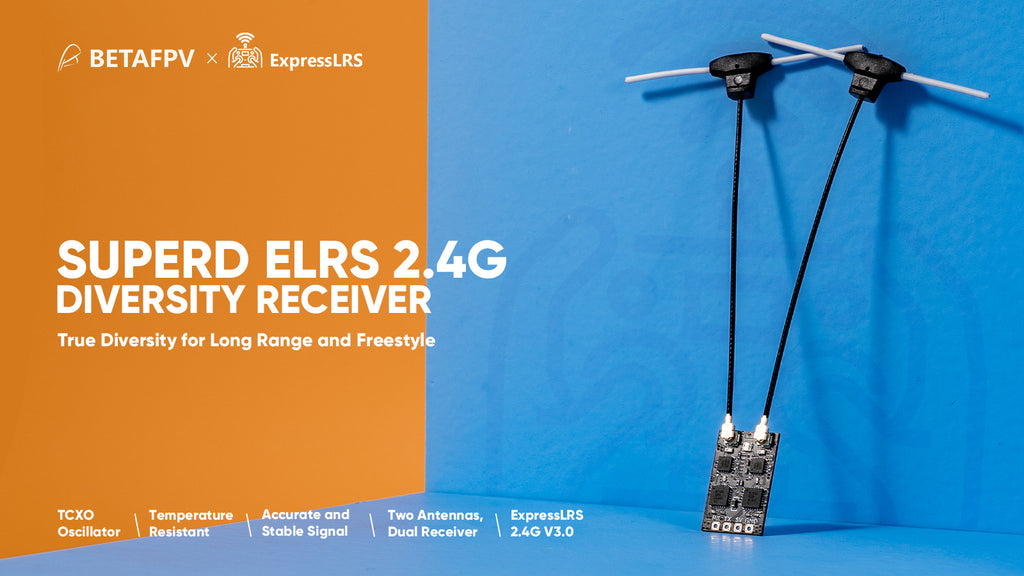
Bullet Points
- A true diversity receiver with two complete RF receiver chains (referring to PA+LNA+SX1280), based on the latest official ExprssLRS. It comes with ExpressLRS V3.0.0 firmware.
- Ultralight weight only 1.1g without the antenna. The receiver board features a reasonable layout and is impeccably clean. Very easy to solder.
- Two Dipole T antennas will create an omnidirectional signal for good signal transmission. Placing the antenna separately and vertically as far part as possible to get a better signal is recommended.
- Not only it is used for FPV drones but also for FPV fixed-wing, or other FPV aircraft. It has superb performance in long range flying.
Specification
- Item: BETAFPV SuperD ELRS 2.4G Diversity Receiver
- MCU: ESP32 PICO D4, dual SX1280 (SX1281)
- Antenna Connector: IPEX MHF 1/U.FL
- RF Frequency: 2.4GHz (2400~2480MHz)
- Telemetry Power: 20dBm (100mW)
- Receiver Protocol: CRSF
- Input Voltage: +5V DC @ “+” pad
- PCB Size: 22mm*14mm
- Weight: 1.1g excluding antenna
First True Diversity Receiver with TCXO
SuperD ELRS 2.4G Diversity Receiver is built-in a TCXO (temperature compensated crystal oscillator), which is shared by two RF chips for a super accurate clock source. The true diversity receiver including two RF chips and PA+LNA will generate a large amount of heat when working. With the high-quality TCXO, it can withstand extreme temperatures with no fear of heat and cold, continuously outputting accurate frequency for long range flight.
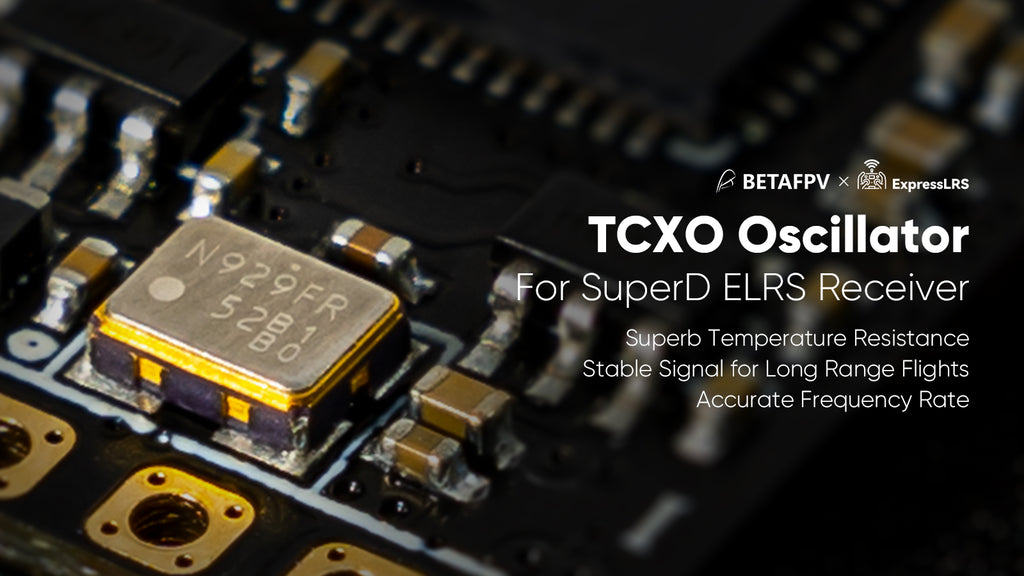
BETAFPV ExpressLRS Receivers
SuperD ELRS 2.4G Diversity Receiver has dual RF receiver chains with two antennas, ensuring longer and more stable flying for FPV drones and RC airplanes. Choosing a suitable receiver to fly quadcopter or other RC models is very important. BETAFPV ExpressLRS Receivers including ELRS Lite, Nano, Micro, and the newest SuperD, greatly fulfill pilots' requirements for FPV flying.
| SuperD RX | Micro RX | Nano RX | Lite RX | |
| Weight | 1.1g (RX only) | 3.5g (RX only) | 0.7g (RX only) | 0.47g (Tower), 0.53g (Flat) |
| Antenna | IPEX MHF + T antenna | IPEX MHF + T antenna | IPEX MHF + T antenna | SMD ceramic antenna |
| MCU | ESP32-PICO-D4, dual SX1280 | ESP8285 | ESP8285 | ESP8285 |
| RF Chip | Dual SX1280 + Dual PA | SX128X | SX1280 + PA, SX1276 + PA | SX128X |
| Frequency | 2.4GHz ISM | 2.4GHz ISM | 2.4GHz ISM, 915MHz (FCC), 868MHz (EU) | 2.4GHz ISM |
| Telemetry Power | 100mW | 17mW | 100mW | 17mW |
| Serial Output Protocol | CRSF | PWM or CRSF | CRSF | CRSF |
| Model Type | FPV Drone, Fixed-wing aircraft | Fixed-wing aircraft, Helicopter, RC Cars, RC Boats | FPV Drone | Whoop Drone |
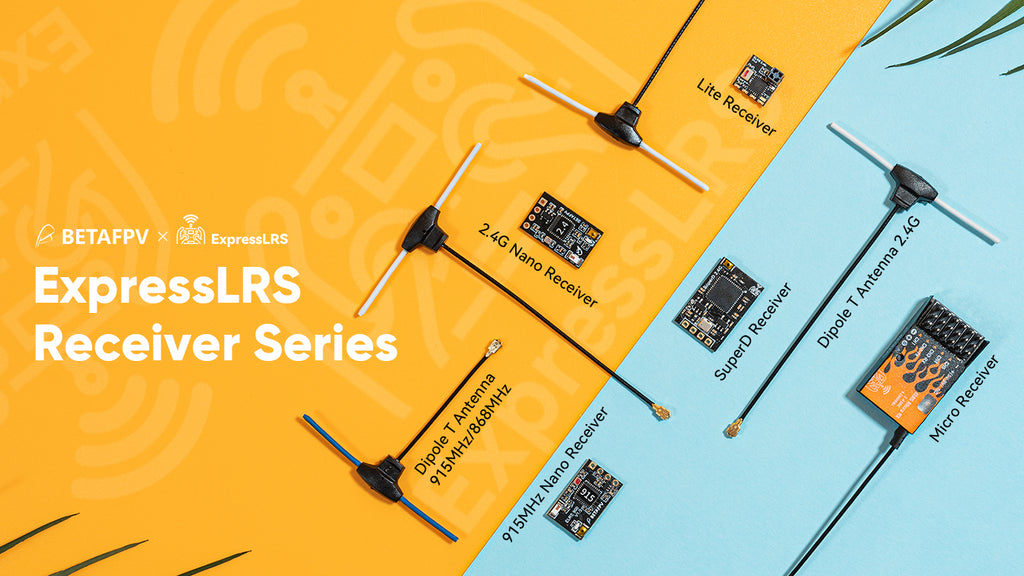
Diagram
The diagram for SuperD ELRS 2.4G Diversity Receiver. Below picture is the front for RX.
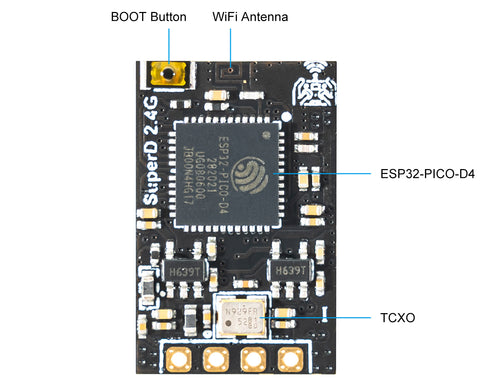
The back of the RX is below.
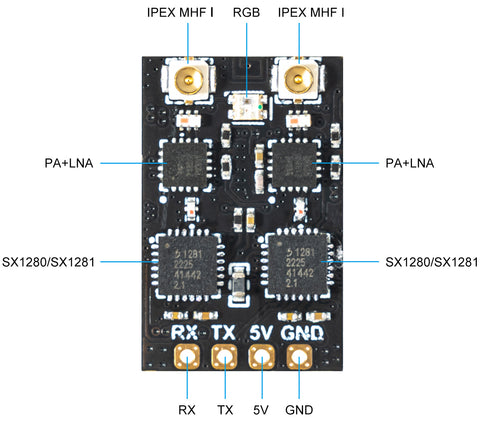
SuperD receiver RGB status indication is shown below.
| RGB Color | Status | Description |
| Rainbow | Fade effect | Power on |
| Green | Quick flash | WIFI upgrading mode |
| Red | Quick flash | No RF chip detected |
| Orange | Double flash | Binding mode |
| Orange | Triple flash | Connected, but mismatched model-match configuration |
| Orange | Slow flash | Waiting for connection |
| Solid on | Connected and color indicates packet rate |
The RGB light color corresponding to the packet rate is shown in the figure below.

Note: F1000 and F500 are packet rates in FLRC mode, providing faster modulation and lower latency, but at the same time having shorter reception distance than normal Lora mode. This mode is great for racers.
D500 and D250 are packet rates in DVDA (Deja Vu Diversity Aid) mode. This mode works at the F1000 data packet rate of FLRC mode, providing better link connection in the case of complex interference by sending the same data packet multiple times. D500 and D250 indicate that the same data packet is sent twice and four times respectively.
Configuration & Bind
ExpressLRS uses the Crossfire serial protocol (AKA CRSF protocol) to communicate between the SuperD diversity receiver and the flight controller board. Take the flight controller using the Betaflight firmware as an example to introduce its wiring and port configuration.
The connection between the SuperD diversity receiver and the flight controller is shown in the figure below

Connect the flight controller to the Betaflight Configurator for basic configuration. First, on the "Port" page, enable the flight controller serial port (take UART1 as an example) as "Serial Rx".
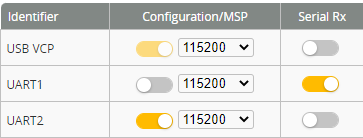
On the configuration page, set Receiver Mode to Serial (via UART) and Serial Receiver Provider to CRSF.
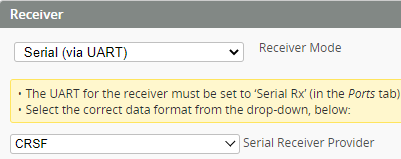
The default firmware of the SuperD diversity receiver uses the ExpressLRS V3.0.0 protocol and has no preset binding phrase. Therefore, the firmware version of the transmitter module must be ExpressLRS V3.0.0 or later versions. Both the receiver and transmitter module should not have any binding phrase.
- Power on and off the SuperD diversity receiver three times with 1 second between each interval continuously to enter the Binding Mode.
- RGB indicator flashes twice quickly on the SuperD diversity receiver, indicating that the receiver is now in Binding Mode.
- Configure remote control or transmitter module to bind with the receiver; If the receiver RGB indicator is solid on, this indicates that the receiver has successfully bound.
Note: After binding once, the receiver will remember the autosaved binding phrase and device. Further restarting of the device will be bound automatically without the need for a rebinding process.
When binding the receiver, the duration for powering on/off should be 1 second each time, making sure the RGB not lighting.
If you would like to flash the official ExpressLRS V3.0.0 firmware for SuperD receiver, please upgrade ExpressLRS Configurator to V1.5.2. Select the target device "BETAFPV SuperD 2.4GHz RX"
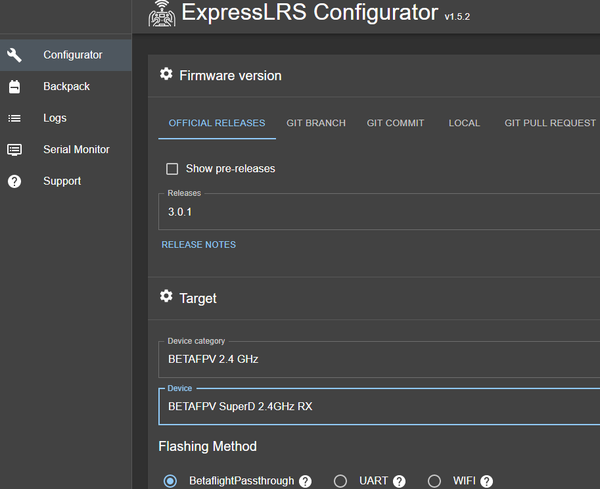
FAQ
- BETAFPV SuperD ELRS 2.4G Diversity Receiver user manual for download.
- Download the Firmware for SuperD ELRS 2.4G Diversity Receiver.
- How to flash the firmware via Passthrough or WIFI for SuperD Receiver.
- Download TPU holders 3D-printing STL file for SuperD ELRS 2.4G Diversity Receiver.
Know More About ExpressLRS
ExpressLRS is an open-source RC link for RC applications. Everyone could find this project on Github or join the discussion in Facebook Group.

Package
- 1 * SuperD ELRS 2.4G Diversity Receiver
- 2 * BETAFPV Dipole T Antenna
- 1 * Pin Header
- 1 * 30AWG Silicon Wires (1 black, 1 red, 1 white, 1 yellow)
- 1 * User Manual
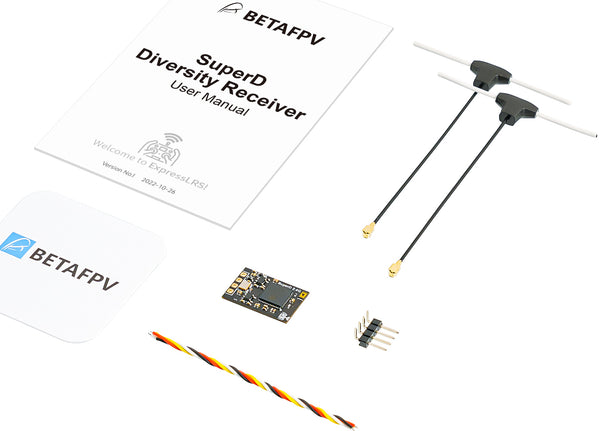
16 otros productos en la misma categoría:









